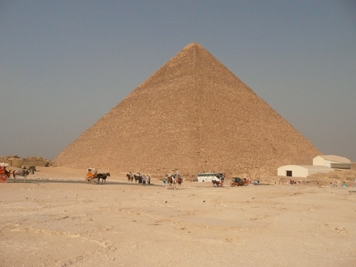Egypt is a facinating country and we had a wonderful time. Especially having the opportunity to share it with our good friends from Illinois, Marilyn & Bob Wilson. We really enjoyed travling with them. Marilyn was our photographer and travels with two high powered cameras that she uses rather well. So the majority of the photos come from her. Thanks Marilyn!

With two nights in San Francisco and our short flight to JFK behind us, we were ready for our overnight flight on EgyptAir to Cairo.
For someone who just loves to travel I really hate the very long flights. This was no exception. The EgyptAir flight was absolutely full and took eleven plus hours. To our surprise and dismay no alcoholic beverages were served. EgyptAir is really missing the boat.
Upon arrival in Cairo, we were met by our tour guide Hazem plus the other forty or so members of our tour group, got our luggage, paid $15.00 for our Egypt visa, cleared immigration, boarded our bus and set off to our hotel.
After checking in we headed to the pool piano bar where we discovered Sakara Gold beer and immediately dubbed it our drink of choice for the next 20 days. Although Sakara is made by Heineken there is no skunkiness smell. Yes, their no alcohol culture doesn't apply everywhere. Booze can be found in the major tourist hotels and restaurants and even in the markets but not on the airline.
Egypt is definately a third world country trying to catch up with its booming population. The infrastructure is lagging their growth but they are working hard to improve it. Cairo especially has some very poor areas including a huge population living in a cemetary.
According to our guide, Egypt's population is unknown but is estimated at over 88 million people mostly located along the Nile River & Delta area. Cairo has in excess of 18 million people. More than 90% of Egypt is desert.
Looking out the airplane window as we were landing the first thing I noticed was the pollution and the color (or lack of it) of the city and the buildings. Everything was a hazy color of sand or dust. Later I found out that everything, I mean everything was covered with a layer of dust and dirt.
The other very noticeable thing was how heavily guarded everything was - Security was everywhere. All uniformed police are armed and the plain clothed tourist police all have Uzi weapons under their suit jackets.
We boarded our bus and before we left the airport grounds our personal plain clothed armed tourist guard joined us on the bus for the ride to the hotel. We never went anywhere without an armed guard. Upon arrival at the hotel we and our baggage went through metal detectors and a good once-over by several hotel security guards. We weren't sure whether we should feel safer or be concerned. Egypt hasn't had a terrorist problem since the Luxor Massacre back in 1997 where 59 tourists were killed.
We never felt we were in any danger. My only worry was the guards lack of concern with their weapons. I wondered whether one of the policemen would accidently shoot one of us. Did those guns have safeties?
Although the Nomadic population can be traced back as far as 10,000 BC, Egyptian history is generally given as 3,100 BC. The area was divided (polarized) into two opposing kingdoms of North (Lower Egypt) and South (Upper Egypt). Around 3,000 BC the two halves were unified by King Narmer (Menes).
It is believed the first capital of united ancient Egypt was Memphis a city whose name can be roughly translated into English as "White Walls." Located in Lower Egypt, just below the Nile Delta, Memphis was founded by Menes, the first king of Egypt, around 3,000 B.C. following his unification of the country. During the First Dynasty, Egypt's center of government was located in Memphis because the city united Upper and Lower Egypt. Memphis is famous for the cemetery at Saqqara,the site of Egypt's earliest pyramid (2650BC), the Step pyramid of Djoser. The Step pyramid built for King Djoser was constructed by his architect, the high priest Imhotep and was the prototype for all other pyramids that followed.
When refering to Upper Egypt and Lower Egypt, the Upper and Lower are refering to the Nile River because the Nile flows NORTHWARD from equatorial Africa , the "Upper Nile" is the southern end and "Lower Nile" the northern end, where its delta meets the Mediterranean Sea.
The Nile River is the longest river in the World with a length greater than 4,000 miles. One doesn't swim in the Nile river for two reasons - it's polluted and full of crocodiles that can grow in excess of four meters.
After relaxing at the pool, we finished our Sakarra Gold beers, went to our room & unpacked, freshened up and went down for our trip briefing and a great welcoming dinner. We met all the rest of the people traveling with us and our tour guide gave us a briefing on our tour.
We've broken the Egyptian part of our trip into seven major parts. For more info and pictures on each just click below. They are arranged left to right as we traveled the Nile River from Alexandria to the Sudan.






